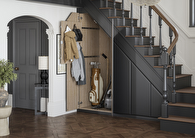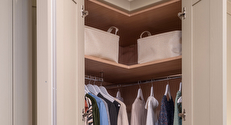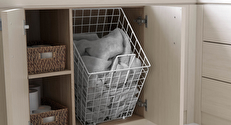
Five ways to reclaim unused space in older properties
Older properties are full of character, from high ceilings to unconventional layouts, but these features can also make furnishing and organising tricky.


Here at Hammonds, we understand the importance of keeping your home in a leading position in the property market, for when it’s time to sell up and move onto pastures new.
In an age where the latest interior trends and design inspiration for your next home improvement project come directly from the depths of social media scrolling, we wanted to find out the best and most efficient ways you can add extra value to your property.
We surveyed 2,000 UK adults to identify what the nation’s ‘most valuable’ features are when it comes to looking for a new property, and what homeowners would currently be willing to spend on a wide variety of home improvement projects, in order to add value to our homes.
In addition to this, we spoke to a trade expert who explained their top tips and what to expect when trying to increase the value of your home.

To get the results from our survey, we presented 2,000 people with a list of 30 homely features that could potential add extra monetary value to the property, and asked whether people would be prepared to pay either ‘less than,’ ‘nothing more or less,’ or ‘more than’ for that feature.

The most common feature that more than a third of British adults (35%) and approximately 18.8 million of us would be prepared to offer above the asking price of a property for, is a garden, whilst following closely behind in second place with 32% is a driveway.
Around three in ten of us (30%) would be willing to pay more if there is a newly installed bathroom in the property whilst a further 15.6m British adults (29%) would consider a higher offer if the home features an en-suite.
Conservatories are on more than a quarter of UK adults’ (27%) higher bidding list and additionally the same amount would consider a bid of more than the asking price if the property features entirely triple glazing – that's around 14.5 million people!
Around one in four Brits (26%) would be compelled to splurge more on their dream home if they featured solar panels to generate power for their home, whilst on the contrary, the same amount would pay more than the asking price for a two-car garage.
Completing the top ten ‘most valuable’ features for a British home are lots of storage space, which a quarter of Brits (25%) of us would pay more than the asking price for, and a further 23% would spend more than the intended asking price for underfloor heating.

Whilst many of us won’t be looking to move anytime soon, there are several home improvement projects that Brits would be willing to undertake in order to improve the value of their homes.
Home improvement projects Britons are prepared to pay £35,000+ for
Despite the typically gloomy British weather, one in four adults (24%) would currently be prepared to spend more than £35,000 on solar panels for their homes, as the increase in popularity for more sustainable methods of generating electricity continues.
More than half a million homes in the UK now rely solely on solar panels to generate electricity and with this number forecast to increase over the coming years as solar panels become more affordable, a quarter of us would prioritise this particular investment in the hope to source cleaner energy and keep our energy bills down.
Nearly a quarter (23%) of us would be willing to fork out for an extension to the property – whether that be an orangery, a new conservatory, a rear extension or more, it seems as though this is one of the more popular home improvement projects across the nation.
Just over one in five (22%) would be prepared to spend over £35k for a new kitchen, despite the average high-end kitchen costing around 350% less than this, according to Property and Construction expert Thomas Goodman of MyJobQuote.co.uk.
Completing the top five most popular home improvement projects that we would be willing to spend more than £35,000 on are both projects involving a new bathroom and a new living room, with one in five (20%) of the British population open to spending this much on either.
Undeterred by the current economic climate, more than one in five (22%) Brits would be prepared to splurge more than £35,000 on a new kitchen, with a further quarter (24%) willing to spend this on new solar panels.
Although our findings revealed that a certain percentage of the population are prepared to dig deep for their project of choice, the cost of our new home improvements may not be as much as first thought.
Thomas Goodman revealed that new solar panels could cost just as little as £5,000, whilst saving you hundreds of pounds a year in the long run:
“The cost of solar panels and the savings involved will depend on what type you go for and how you use them. For instance, 3kW monocrystalline panels are likely to cost between £5,000 and £6,000, while 5kW versions will be a little higher at around £7,500 to £9,000. Polycrystalline panels are cheaper to buy, however they don’t work as efficiently. If you don’t like the idea of panels sticking out from your roof, you may prefer to go with solar tiles but for these you’re likely to pay around £12,000. You’ll also need to factor in the cost of any roof repairs that need doing first.
“The amount of money you save is slightly dependent on the number and type of panels you have and the kW of the system. As is the amount of energy you use. But typically you can save between £135 and £360 per year.
“You can make sure you use more of the energy you generate by installing a battery storage system but this will add around £2,000 to your solar panel cost.
“Whether you sell your unused electricity back to your energy company will also affect the returns you see on your solar panels. To sell your energy, you’ll need to sign up to the Smart Export Guarantee (SEG) when your panels are installed. Doing this could make you an average of around £370 per year.”
Whilst many homeowners are constantly finding ways to save on our money through home improvement projects, Thomas Goodman explains why you should carefully consider a tradesperson to carry out your home improvement job rather than completing the job yourself:
“A tradesperson has the knowledge, skills and tools to complete a job safely and effectively. You should also get a better finish when it comes to things like walls and floors and new kitchens and bathrooms.
“For big jobs such as roofs and extensions, you should always choose trades to do this work. Not only is it safer, but this is a skilled job that can easily go wrong if it’s DIYed. Plus, your roofer or builder will have the right insurance cover and this type of work should be guaranteed, giving you peace of mind.
“Gas and electrical work can only be carried out by trades with the correct qualifications and certificates. For gas installations and servicing, you’ll need to use a Gas Safe registered engineer and for fixed electrical installations, you’ll need an electrician that’s registered with a Government-approved Part P scheme. This is essential to keep your home safe and to ensure installations meet legal requirements.
“Using reliable and qualified trades can save you time and money. They will know how to complete a job quickly and will make fewer mistakes. So, they won’t waste materials.”
Whilst the majority of larger jobs will require you to hire a tradesperson, this doesn’t mean to say that the smaller jobs can’t be done yourself! Just make sure to choose carefully with what you decide to take on.

Across a wide range of lifestyles, occupations, and ages we all have different priorities in life when it comes to purchasing our next dream move.
A quarter of Londoners (24%) would be prepared to pay £6,000 more for a property that featured a home office installed, likely the price they would have to pay to escape the hustle and bustle of commuting to work five days a week, whereas in Belfast, just a mere 6% would claim to pay more.
Over a quarter of (28%) Liverpudlians would be willing to splurge more on a property that features lots of storage space, closely followed by Bristolians and Norwich residents (28% again) who would also pay more for this valuable feature.
Residents of the Welsh capital Cardiff are the most likely in the UK to pay more than the asking price for a home that features a driveway, with almost half (42%) of its residents admitting they would go above and beyond the intended price.
Almost a third of East Anglians in Norwich (30%) would be prepared to offer more for a property if it featured a downstairs toilet, the added convenience must be worthwhile.
One third of men (33%) would be willing to pay more for a property with solar panels, compared to just one in five women (22%), the largest difference between the two.

When it comes to home improvement projects, it is not uncommon for partners to argue over household bills, in fact our study showed nearly a third (31%) of couples argue over money, which is also the second biggest cause of tension in households.
So, it may come as no surprise that men and women of the UK could have another money-fuelled argument on their hands when it comes to paying for a new living space.
This is because women are more likely to reach deeper into their pockets for a home improvement project, in comparison to their male partners – with the biggest indifference being that women are prepared to pay more than 43% of what men would be willing to pay for a home office renovation/installation from scratch.
Our research showed that women, on average, would be willing to pay more than 33% of the value that men would be willing to pay for a home improvement project, with the smallest indifference being a brand-new kitchen installation, with the male and female valuation 21% apart.

Our research found that lots of storage space was the ninth most valuable asset a home can have when it comes to adding value onto a home for the purpose of coming to sell up.
It is no surprise that increased storage space can add value onto your home, and with a quarter of us prepared to pay more for a property with a plentiful amount of added space for our belongings, the importance of extra storage space comes with more benefits than just the extra value onto your home.
By adding more storage space into your bedroom, living space, office space or whatever your desired room is, your entire home space will look well-organised throughout and present you with a much clearer headspace for you to relax and unwind, without the added clutter scattered about your environment.
Not only is a home that boasts additional storage space more valuable than one that doesn’t, but it also presents you with a more peaceful and less stressful environment for you to live in.
Our dynamic and stylish range of storage solutions can help elevate your surroundings to the next level, helping you to improve the look of your favourite rooms without all the hassle of your belongings getting in the way.

Older properties are full of character, from high ceilings to unconventional layouts, but these features can also make furnishing and organising tricky.

Attics are often treated as overflow storage.

Starting your day in a calm, organised bedroom helps everything else fall into place.
Whether you have an exact vision in tow, or are just at the beginning stage of your home renovation, we have heaps of inspiration for you to get stuck into.
Find a wealth of design tips, trends and inspiration in the pages of our brochure, magazine and on our blog. Our experts are always ready to help you create dream home, pop in store or book your free design visit for experts to help on bringing your vision to life.